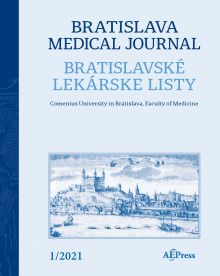Journal info
|
||||
Select Journal
Journals
Bratislava Medical Journal 2024 2023 2022 2021 2020 2019 2018 2017 2016 2015 2014 2013 2012 Ekologia - Ecology Endocrine Regulations General Physiology and Biophysics Neoplasma Acta Virologica Studia Psychologica Cardiology Letters Psychológia a patopsych. dieťaťa Kovove Materialy-Metallic Materials Slovenská hudba 2025Webshop Cart
Your Cart is currently empty.
Info: Your browser does not accept cookies. To put products into your cart and purchase them you need to enable cookies.
Bratislava Medical Journal Vol.125, No.1, p.50–54, 2024 |
||
| Title: Characteristics of delirium among COVID-19 patients | ||
| Author: Dominika JARCUSKOVA, Miriam KOZAROVA, Marian BALI-HUDAK, Alexandra LACKOVA, Jakub GAZDA | ||
| Abstract: OBJECTIVE: This study estimated delirium incidence in Slovak COVID-19 patients, explored treatment associations and examined the impact on hospitalization and mortality. BACKGROUND: The COVID-19 pandemic caused by SARS-CoV-2 has significantly affected global health. Delirium, a severe form of acute brain dysfunction, is common in hospitalized patients, including those with COVID-19. METHODS: A retrospective study analyzed data from 474 hospitalized patients with confirmed SARS-CoV-2 infection in Kosice, Slovakia. Delirium was diagnosed using standardized ICD-10 criteria. Statistical analyses examined associations between delirium, psychiatric symptoms, treatment modalities, hospitalization duration, and mortality. RESULTS: 29.54 % (140 patients) had delirium. Insomnia, anxiety, and delirium were prevalent psychiatric symptoms. Delirium patients had higher insomnia, anxiety, somnolence, agitation, and aggression rates. Treatments like high-flow nasal oxygen, glucocorticoids, antibiotics, and anakinra were associated with higher delirium incidence. Delirium was more common with antipsychotic use (tiapride, quetiapine, haloperidol), while citalopram seemed protective. No significant associations were found with mortality. Patients using benzodiazepines, hypnotics, or tiapride had longer hospital stays. CONCLUSION: This study provides insights into delirium incidence in Slovak COVID-19 patients, treatment associations, and the importance of managing psychiatric symptoms and treatment choices for optimal outcomes (Tab. 6, Ref. 33). |
||
| Keywords: delirium, COVID-19, psychiatric drugs, cognition, psychiatric comorbidities of COVID-19 | ||
| Published online: 09-Oct-2023 | ||
| Year: 2024, Volume: 125, Issue: 1 | Page From: 50, Page To: 54 | |
| doi:10.4149/BLL_2024_009 |
||
|
|
 download file download file |
|

